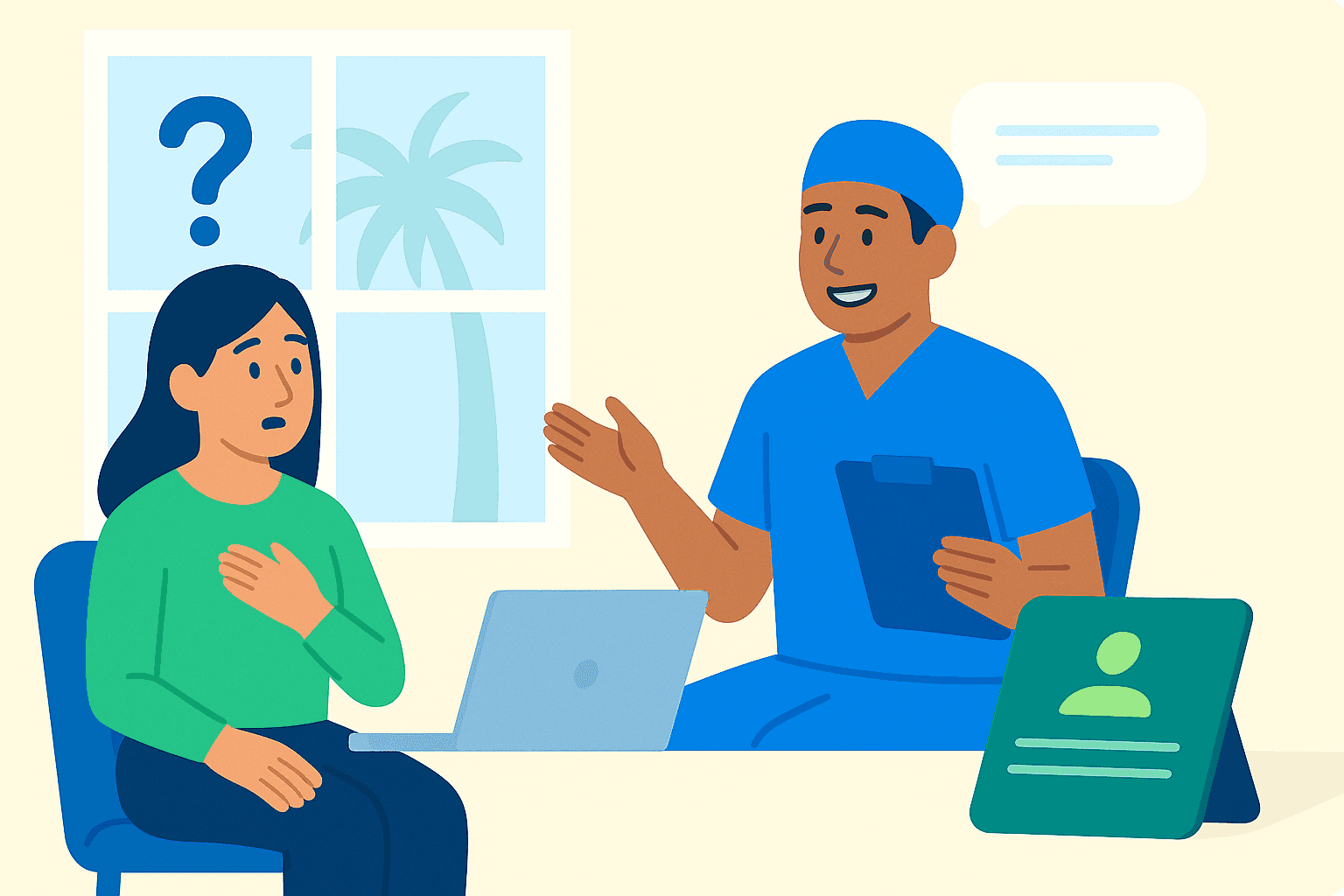Do dentists in Santo Domingo speak English?

Quick Answer:
Many dentists in Santo Domingo speak English, especially in clinics serving international patients. However, proficiency varies. With heva, patients can identify verified bilingual dentists, communicate in over 100 languages, and pay seamlessly in multiple currencies—all in one secure system.
Updated November 2025
Why language clarity matters before treatment
Short answer: Miscommunication during medical or dental care can affect safety, results, and trust.
Dental tourism in Santo Domingo continues to grow, with travelers seeking procedures such as implants, veneers, and full-mouth restorations at competitive prices. But as the World Health Organization (WHO) emphasizes, clear, language-appropriate communication is a safety requirement, not an optional convenience. Even small misunderstandings about anesthesia or recovery instructions can lead to complications.
That’s why heva embeds translation and coordination directly into the care process, allowing doctors and patients to communicate naturally in their preferred language without relying on ad-hoc interpreters.
How common is English among dentists in Santo Domingo?
Short answer: Many Dominican dentists speak English, especially in international clinics—but it’s not universal.
Dentists in Santo Domingo often train in the U.S., Spain, or Latin America, improving English fluency. Clinicians such as Dr. Alan López Gelabert publicly provide English-language information, signaling a focus on international patients. However, smaller or local practices may operate exclusively in Spanish.
As the Colegio Dominicano de Odontólogos (CDO) notes, dentists are regulated under national licensure standards, but bilingual communication depends on each provider’s training and clientele heva simplifies this by allowing patients to filter clinics by supported languages before booking.
What happens if your dentist doesn’t speak English?
Short answer: Even highly skilled clinicians can face limits without structured communication tools.
Patients often rely on staff or relatives to translate, which research shows increases errors. The Agency for Healthcare Research and Quality (AHRQ) reports that ad-hoc interpreters make more clinically significant mistakes than trained language professionals.
When a clinic uses heva, language coordination is built into the workflow. This means all of your dentist’s notes, consent forms, and follow-ups can appear in your language automatically. This ensures informed consent and precise care, reducing stress and miscommunication during treatment abroad.
How heva transforms the global patient experience
Short answer: heva gives doctors tools to deliver multilingual, globally accessible care—without changing how they practice. Dentists who use heva aren’t just bilingual—they’re globally enabled.
- Over 100 languages supported: Every patient message, record, and treatment plan can be viewed in the patient’s native language.
- Multi-currency payments: Patients can pay in USD, DOP, EUR, or other currencies while providers receive funds directly, avoiding wire fees.
- Integrated verification: Doctors’ credentials are verified through authorities like the CDO for added trust.
In short, heva turns logistical complexity into quiet fluency—helping doctors focus on care and patients focus on healing, not translation or payment logistics.
Should you bring a translator anyway?
Short answer: Usually not necessary if you choose a bilingual provider or a clinic that uses heva.
The U.S. Embassy in Santo Domingo advises confirming communication capabilities before travel. Professional interpreters exist locally, but most heva-partnered clinics already support English consultations or multilingual coordination tools—making long or multi-visit treatments smoother and safer.
Looking for an English-speaking dentist in Santo Domingo?
Compare verified bilingual providers and coordinate your treatment securely at heva.co/patients.
Frequently Asked Questions
1. Do most dentists in Santo Domingo speak English?
Many do, particularly those trained internationally or working with dental tourists, but fluency varies by clinic. Confirm language support before booking.
2. How can I verify a dentist’s license?
Check registration with the Colegio Dominicano de Odontólogos (CDO). heva also performs credential verification for every listed provider.
3. What languages are supported through heva?
heva supports over 100 languages including English, Spanish, French, and Portuguese—allowing natural communication without outside translation.
4. Can I pay in my home currency?
Yes. heva supports global payments in multiple currencies like USD, DOP, and EUR, making cross-border care more convenient.
5. Why is structured language support safer than informal translation?
According to the AHRQ, ad-hoc interpreting increases clinically significant errors; structured multilingual systems reduce risk.
Disclaimers
Medical Disclaimer: This article provides educational information about medical tourism safety considerations. It is not medical advice. heva is a healthcare coordination platform connecting patients with providers—we do not provide medical advice, diagnosis, or treatment. All medical and travel decisions should be made in consultation with qualified healthcare professionals.
Safety Information: Safety recommendations are based on best practices and expert guidelines. Individual circumstances may require additional precautions. Patients should continue to conduct their own research and verification of providers and facilities. heva facilitates connections but does not guarantee results or safety outcomes.
Insurance Information: Insurance recommendations are general guidance only. Specific coverage needs vary by individual circumstances and procedures. Patients should consult with insurance professionals to determine appropriate coverage levels and providers.
International Healthcare: International medical care involves inherent risks and additional considerations including emergency protocols, legal differences, and care coordination. Patients should thoroughly research all aspects and maintain realistic expectations about cross-border healthcare.
About the Author
Varun Annadi — Co-Founder & CEO of heva
Varun Annadi leads heva, an AI-native practice-management platform connecting global patients with licensed healthcare providers. He holds an MBA from Harvard Business School and a B.S. in Engineering from the University of Michigan, and previously led health-tech initiatives at Apple, Google, Stryker, and Noom.